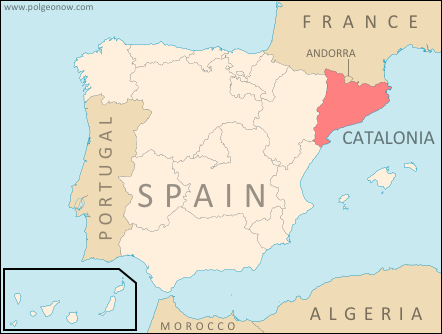Catalonia – thousands protest
October 3, 2017 | Expert Insights

Catalonia’s vote for an independent state on October 1st, 2017, was marred by confusion and violence. At least 861 people were reportedly injured.
According to Catalan officials, close to 90% have voted in favor of independence. In response to the hardline posture by the police force on Tuesday, crowds gathered in the Catalan capital, chanting for independence. They also called the Spanish policy an “occupying force” and urged them to leave the region.
Background
Catalonia is one of the most industrialized regions in Spain. Barcelona is the region’s largest city as well as its capital. Even though it is part of Spain, the region has a distinct culture and history dating back to the Middle Ages. Many native Catalans think of themselves as separate from Spain. Catalonia will be the ninth largest economy if it leaves Spain.
The political movement for a separate state of Catalonia can be traced back to 1922. Francesc Macià, the 122nd President of Catalonia founded the independentist party Estat Català. In 1931, after winning the elections, Macia declared the independent state of Catalonia. After negotiations with Spain, he accepted autonomy rather than independence. However, during the Spanish Civil War, General Francisco Franco abolished that autonomy. It is currently designated as a nationality by its Statute of Autonomy.
In 2014, a non-binding Catalan self-determination referendum was held. Over 80% of the people voted in favor of independence.

Analysis
The regional parliament of Catalonia had approved for the vote to be held on October 1st, 2017. The Spanish government had previously stated that it would do everything within its power to block the referendum from taking place. It had also taken control of Catalonia's finances to prevent funds from being used in the referendum. The main government stated that the vote would be considered null and void as well as illegal.
On October 1st, 2017, more than 2.2 million people are said to have voted. There are 5.3 million registered voters in the region. According to Catalan officials, just under 90% voted overwhelmingly for independence. However, the day was marked by violent outbreaks between civilians and Spanish police. Multiple polling stations were forcibly closed and urns were confiscated. According to authorities, nearly 750,000 votes could not be counted as result. The Spanish Civil Guard also opened fire (rubber bullets) on the citizens who had come to vote. At least 861 people are reportedly injured.
Catalan leader Carles Puigdemont has said that Catalonia had won the right for its independence. He said, “With this day of hope and suffering, the citizens of Catalonia have won the right to an independent state in the form of a republic. My government in the next few days will send the results of today's vote to the Catalan parliament, where the sovereignty of our people lies, so that it can act in accordance with the law of the referendum.”
The Spanish government has stated that if Catalonia declares its independence, then the government would invoke Article 155 of the country's constitution. This gives the government the power to intervene in the running of an autonomous region. Several leaders from the EU region have remained conspicuously silent. So far, only the Belgium Prime Minister, Charles Michel has rebuked the Spanish government by noting, “Violence can never be the answer!”
The Spanish football giant, Barcelona FC also announced its intent to strike over the development.
Assessment
Our assessment is that this is one of the biggest political crises Spain has witnessed in decades. To ignore the vote would be to ignore the tenets of democracy in Spain. However, a secession would lead to a painful split that could affect Europe and the European Union negatively. Across the world, other regions are also grappling with the same dilemma as Spain. In Iraq, there is a growing call for an independent state for Kurdistan. It is still unclear as to how the current Spanish crisis will be solved. We believe that the hardline position taken by Madrid has made the people very angry. This is not a good recipe for any reconciliation in the future.








Comments